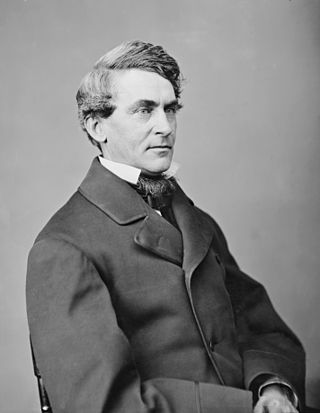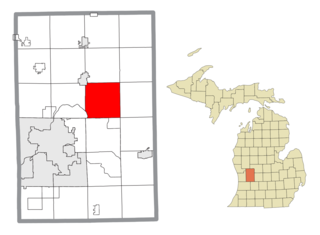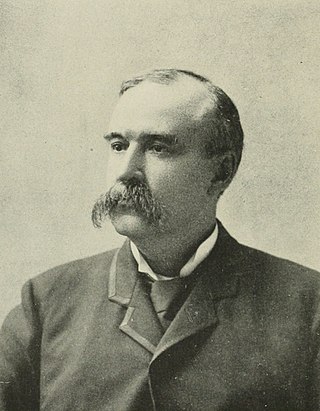
The M109 is an American 155 mm turreted self-propelled howitzer, first introduced in the early 1960s to replace the M44. It has been upgraded a number of times, most recently to the M109A7. The M109 family is the most common Western indirect-fire support weapon of maneuver brigades of armored and mechanized infantry divisions.

Frederick Theodore Frelinghuysen was an American lawyer and politician from New Jersey who served as a U.S. Senator and later as United States Secretary of State under President Chester A. Arthur.

Cannon County is a county located in the U.S. state of Tennessee. As of the 2020 census, the population was 14,506. Its county seat is Woodbury. Cannon County is part of the Nashville–Davidson–Murfreesboro–Franklin, TN Metropolitan Statistical Area.

Fairfield County is a county located in the U.S. state of Ohio. As of the 2020 census, the population was 158,921. Its county seat and largest city is Lancaster. Its name is a reference to the Fairfield area of the original Lancaster.

Cannon Township is a civil township of Kent County in the U.S. state of Michigan. The population was 13,336 at the 2010 census.
The Indian Campaign Medal is a decoration established by War Department General Orders 12, 1907. The medal was retroactively awarded to any soldier of the U.S. Army who had participated in the American Indian Wars against the Native Americans between 1865 and 1891.

George Gray was a United States senator from Delaware and a United States circuit judge of the United States Court of Appeals for the Third Circuit and the United States Circuit Courts for the Third Circuit.

Volcano is a census-designated place in Amador County, California. It lies at an elevation of 2070 feet. The population was 115 at the 2010 census. It is located at 38°26′35″N120°37′51″W, just north of Pine Grove. The town is registered as a California Historical Landmark. The community is in ZIP code 95689 and area code 209.

Angus Munn Cannon was an early Latter Day Saint leader and Mormon pioneer.

The Edmunds Act, also known as the Edmunds Anti-Polygamy Act of 1882, is a United States federal statute, signed into law on March 23, 1882 by President Chester A. Arthur, declaring polygamy a felony in federal territories, punishable by "a fine of not more than five hundred dollars and by imprisonment for a term of not more than five years". The act is named for U.S. Senator George F. Edmunds of Vermont. The Edmunds Act also prohibited "bigamous" or "unlawful cohabitation", thus removing the need to prove that actual marriages had occurred. The act not only reinforced the 1862 Morrill Anti-Bigamy Act but also made the offense of unlawful cohabitation much easier to prove than polygamy misdemeanor and made it illegal for polygamists or cohabitants to vote, hold public office, or serve on juries in federal territories.

James David Santini was an American attorney, politician and lobbyist who served as the U.S. representative for Nevada's at-large congressional district from 1975 to 1983. He was a member of the Democratic Party until 1986, when he joined the Republican Party.

John Albert Tiffin Hull was a ten-term Republican U.S. Representative from Iowa's 7th congressional district. He had earlier served two terms as the Lieutenant Governor of Iowa and three terms as Iowa Secretary of State.
Presser v. Illinois, 116 U.S. 252 (1886), was a landmark decision of the Supreme Court of the United States that held, "Unless restrained by their own constitutions, state legislatures may enact statutes to control and regulate all organizations, drilling, and parading of military bodies and associations except those which are authorized by the militia laws of the United States." It states that the Second Amendment to the United States Constitution limited only the power of Congress and the national government to control firearms, not that of the states, and that the right to peaceably assemble in the First Amendment to the United States Constitution was not protected by the clause referred to except to petition the government for a redress of grievances. This decision was overruled in McDonald v. City of Chicago in (2010).

Clawson v. United States, 113 U.S. 143 (1885), was a case regarding a Utah territorial statute which authorized an appeal by a defendant in a criminal action from a final judgment of conviction, which provides that an appeal shall stay execution upon filing with the clerk a certificate of a judge that in his opinion there is probable cause for the appeal, and further provides that after conviction, a defendant who has appealed may be admitted to bail as of right when the judgment is for the payment of a fine only, and as matter of discretion in other cases, does not confer upon a defendant convicted and sentenced to pay a fine and be imprisoned the right, after appeal and filing of certificate of probable cause, to be admitted to bail except within the discretion of the court.
St. Louis v. Myers, 113 U.S. 566 (1885), was a motion to dismiss for want of a federal question to give jurisdiction regarding Acts that admitted Missouri into the Union while leaving the rights of riparian owners on the Mississippi River to be settled according to the principles of state law and relinquishing to the City of St. Louis the rights of the United States in wharves and thoroughfares, which did not authorize the city to impair the rights of other riparian proprietors by extending streets into the river.

The Taney Court heard thirty criminal law cases, approximately one per year. Notable cases include Prigg v. Pennsylvania (1842), United States v. Rogers (1846), Ableman v. Booth (1858), Ex parte Vallandigham (1861), and United States v. Jackalow (1862).

During the tenure of Morrison Waite as Chief Justice of the Supreme Court of the United States, the Supreme Court heard an unprecedented volume and frequency of criminal cases. In just fourteen years, the Court heard 106 criminal cases, almost as many cases as the Supreme Court had heard in the period from its creation to the appointment of Waite as Chief Justice. Notable cases include United States v. Cruikshank (1875), United States v. Reese (1875), Reynolds v. United States (1878), Wilkerson v. Utah (1879), the Trade-Mark Cases (1879), Strauder v. West Virginia (1880), Pace v. Alabama (1883), United States v. Harris (1883), Ex parte Crow Dog (1883), Hurtado v. California (1884), Clawson v. United States (1885), Yick Wo v. Hopkins (1886), United States v. Kagama (1886), Ker v. Illinois (1886), and Mugler v. Kansas (1887).

Cannon Air Force Base is a United States Air Force base, located approximately 7 miles (11 km) southwest of Clovis, New Mexico. It is under the jurisdiction of Air Force Special Operations Command (AFSOC). The host unit at Cannon is the 27th Special Operations Wing, which activated on 1 October 2007. The 27 SOW plans and executes specialized and contingency operations using advanced aircraft, tactics and air refueling techniques to infiltrate, exfiltrate and resupply special operations forces (SOF) and provide intelligence, surveillance and reconnaissance and close air support in support of SOF operations.















